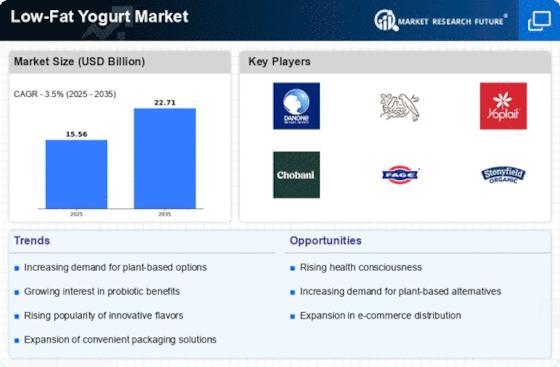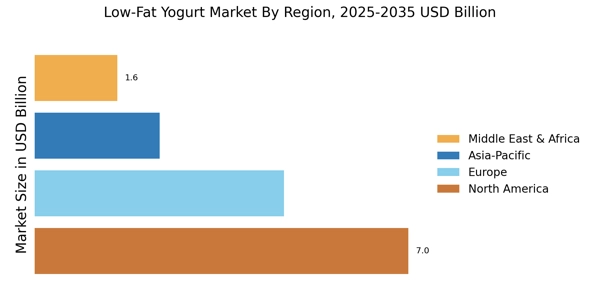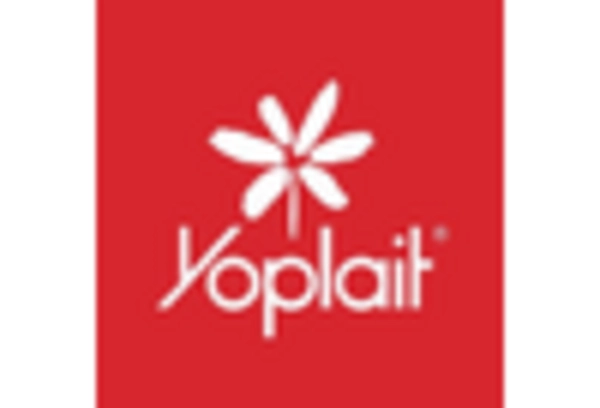Rising Health Awareness
The increasing awareness regarding health and wellness among consumers appears to be a primary driver for the Low-Fat Yogurt Market. As individuals become more conscious of their dietary choices, the demand for low-fat and nutritious food options has surged. According to recent data, a significant percentage of consumers actively seek products that align with their health goals, leading to a notable increase in low-fat yogurt consumption. This trend is further supported by the growing prevalence of lifestyle-related diseases, prompting consumers to opt for healthier alternatives. The Low-Fat Yogurt Market is thus positioned to benefit from this shift in consumer behavior, as more individuals prioritize their health and well-being.
Innovative Flavor Profiles
Innovation in flavor profiles is another compelling driver for the Low-Fat Yogurt Market. Manufacturers are increasingly experimenting with diverse flavors to cater to evolving consumer preferences. This trend is evident in the introduction of exotic and unique flavor combinations that appeal to a broader audience. Market data indicates that flavored low-fat yogurts have gained substantial traction, with consumers showing a willingness to try new and exciting options. This innovation not only enhances the appeal of low-fat yogurt but also encourages trial and repeat purchases, thereby contributing to the overall growth of the Low-Fat Yogurt Market. As brands continue to push the boundaries of flavor, the market is likely to see sustained interest and engagement.
Increased Demand for Convenience
The fast-paced lifestyle of modern consumers has led to a heightened demand for convenient food options, significantly impacting the Low-Fat Yogurt Market. Busy individuals are increasingly seeking on-the-go snacks that are both nutritious and easy to consume. Low-fat yogurt, often packaged in portable formats, meets this demand effectively. Recent statistics suggest that convenience-oriented products are witnessing a surge in sales, as consumers prioritize quick and healthy meal solutions. This trend is likely to drive innovation in packaging and product formats within the Low-Fat Yogurt Market, as manufacturers strive to cater to the needs of time-constrained consumers. The emphasis on convenience is expected to remain a key factor influencing market dynamics.
Growing Popularity of Functional Foods
The rising trend of functional foods is significantly influencing the Low-Fat Yogurt Market. Consumers are increasingly seeking products that offer additional health benefits beyond basic nutrition. Low-fat yogurt, often fortified with probiotics, vitamins, and minerals, aligns well with this trend. Market Research Future indicates that a substantial portion of consumers is willing to pay a premium for products that promote digestive health and overall well-being. This growing interest in functional foods is likely to propel the demand for low-fat yogurt, as consumers recognize its potential health benefits. As the Low-Fat Yogurt Market continues to evolve, the integration of functional ingredients may become a standard practice, further enhancing its appeal.
Sustainability and Ethical Consumption
The increasing focus on sustainability and ethical consumption is emerging as a significant driver for the Low-Fat Yogurt Market. Consumers are becoming more discerning about the environmental impact of their food choices, leading to a preference for products that are sustainably sourced and produced. This shift is prompting manufacturers to adopt eco-friendly practices and transparent sourcing methods. Recent data suggests that a growing segment of consumers is willing to support brands that prioritize sustainability, which could lead to increased loyalty and market share. The Low-Fat Yogurt Market is likely to benefit from this trend, as brands that align with consumer values regarding sustainability may experience enhanced growth and acceptance in the marketplace.

















